From humankind’s earliest moments, through all of history’s innovations and tragedies, across our biggest cities and most remote towns, one thing has always united us—the understanding that we’re all here temporarily. Throughout our lives, most of us will say farewell to grandparents, parents, aunts and uncles, friends, siblings, even children. So, perhaps it would be to all our benefit to learn the art of saying goodbye.
That’s precisely what Valediction, the new immersive, site-specific theatrical experience by Firefly Tapestry Storytelling vows to teach us over the course of its ninety minutes (plus hours of remote interaction that take place beforehand). Staged at the extremely far removed, but architecturally stunning, Hard Luck Castle in Nevada over three nights in January, Valediction is Firefly’s second immersive experience and their first to include in-person interaction. Created by Firefly founder Emma Sheridan, with contributions from Quinn Leary, the experience stars Sheridan, Leary and Austin Minard, with digital media and production assistance by David Mund.
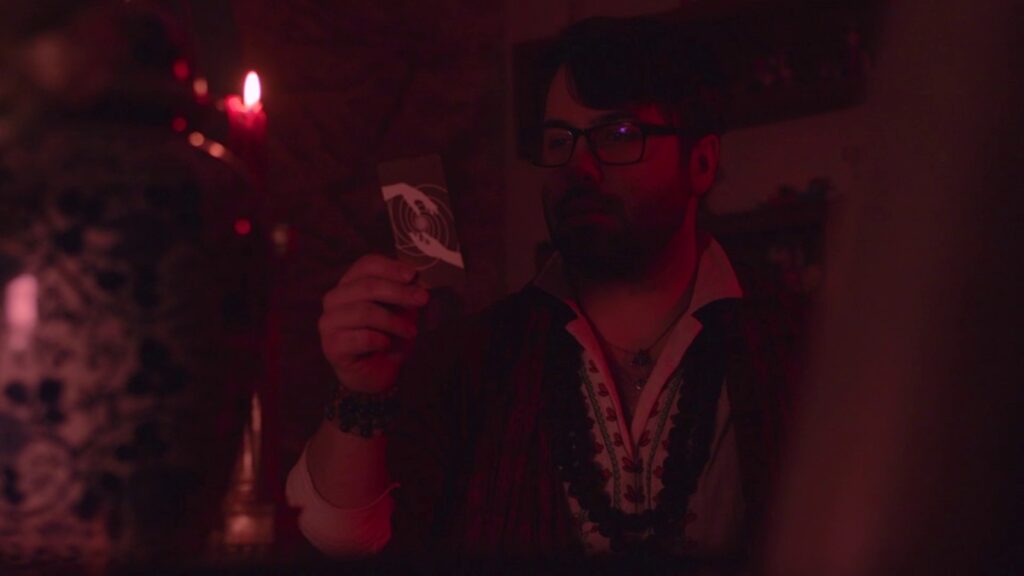
It’s worth mentioning that while Valediction has much to say about remembrance and letting go, it’s not technically a show about death. Not in the literal sense. The experience begins with an introduction to the Fellowship for Astral Truth and Enlightenment (FATE), a collective that bills itself as “a sanctuary for seekers journeying toward greater spiritual understanding.” Acceptance into the group begins with a reading held by Trinity Vale (played by Sheridan), a down-to-earth, slightly skeptical member who introduces you to its New Age mythology and explains the benevolent immortal beings tasked with guiding us collectively through life and what lies beyond. These beings live on planes of existence that are far beyond ours and their influence is generally unseen. What they don’t do is enter our world and interact with humanity.
Not usually, at least.
Along with introducing FATE and their beliefs, this initial reading also serves as a chance to get to know Trinity, who lives with her roommate and lifelong friend Farren Asker (played by Leary) and who invites you to explore the FATE website to learn more about the oracle cards she uses in the reading and peruse a couple of tales from the FATE archives, which read as parables and include life lessons that are aligned with their way of seeing the world. It’s all very metaphysical and it provides the backdrop to all that follows, but what Valediction is really about is the two people who introduce you to all of this—Trinity and Farren. Texts and phone calls from both of them follow your reading, and you uncover that Trinity possesses the ability to manifest objects from her dreams in the physical world as she sleeps, an ability that seems to be getting worse and pushing her towards a reckoning she doesn’t fully understand. This prompts a desperate search by Farren for answers and ultimately, an invitation to you to meet them both, along with a mysterious Oracle tracked down by Farren, at “the Edge of All That is Knowable” (ie. Hard Luck Castle).
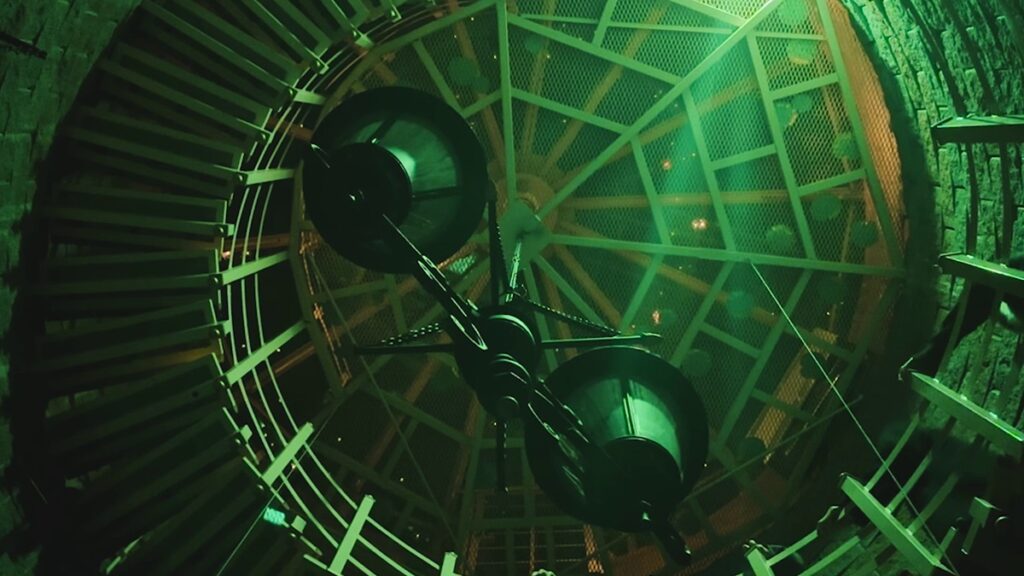
There you discover the truth about Trinity, she’s able to turn her dreams into reality because she’s not really a person at all, but the Luminary, one of FATE’s immortal beings. Her innate curiosity towards humankind resulted in her being allowed to live as one for a short while, but her power and ability is disrupting the natural order of things on Earth and it’s time for her to go home. Leading her back to the metaphysical realm where she belongs is another being, the Archivist, who we discover is the Oracle Farren had been searching for. And we learn we have a role to play as well, as Trinity can’t return without our presence overseeing it all and helping to guide her back.
Admittedly, the metaphysics of it all get rather confusing, especially if you struggle to buy into it, like I did. (I appreciated when in our initial reading, Trinity mentioned that she thought Farren “had joined a cult” when he first told her about FATE.) My initial fear was that this disconnect would prevent me from being able to fully engage with the experience, but fortunately, the mythology isn’t what’s important about Valediction. The experience is really about the necessity of saying goodbye, learning to recognize and celebrate all that we shared with our loved ones, and finding the strength to let go and continue on with our lives. Anyone who’s lost someone they’ve cared about should have no problem relating to that.
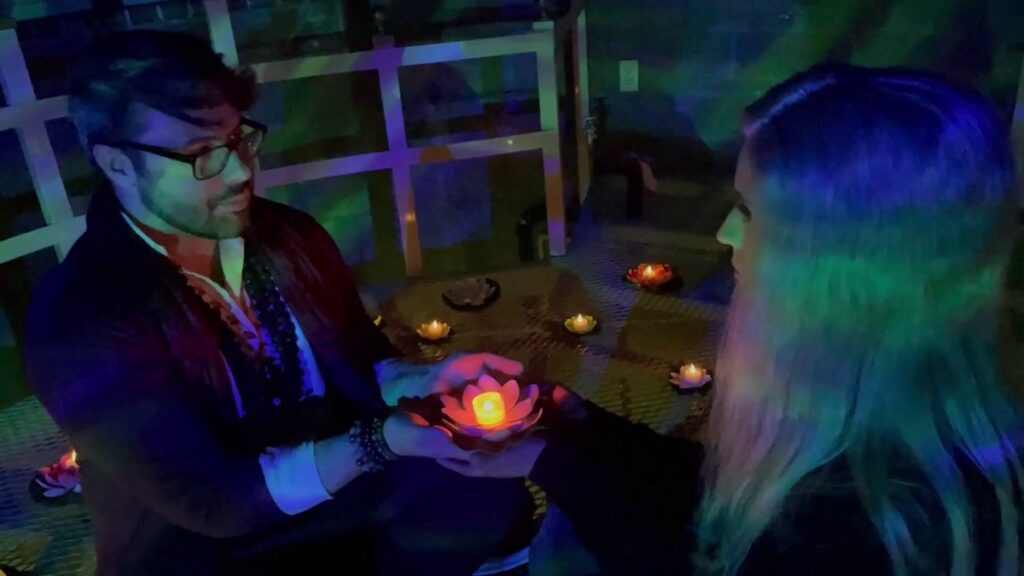
Throughout our time at the castle, we’re shown moments from Trinity and Farren’s lives together, both joyous and sad. Buoyed by a strong script that balances these instantly relatable interactions with more philosophical lessons on saying goodbye, as well as brave performances by both Sheridan and Leary, we gain a clear understanding of how much they’ve meant to each other and how difficult this parting will be. While it represents a loss for both of them—Trinity will no longer be able to interact with Farren once she’s returned to her realm—the pain and difficulty of it really resonates within Farren’s side of the story. Growing up alone with a frighteningly abusive mother, it was through his friendship with Trinity that Farren found the strength to get through it, and along with the sadness he feels over the loss of his friend, he fears he’ll lack the strength to face life’s challenges on his own. Trinity was likely who he would have turned to if he’d lost anyone else close to him, so what is he supposed to do when he loses her?
Valediction doesn’t really provide answers to questions like these, but rather, it reminds us what it is we’re really doing when we say goodbye—we’re acknowledging all the shared moments we’ve had together and accepting the reality that they’re coming to an end. There’s no getting around the fact that this is difficult, and I found the final moments of Valediction to be profoundly sad in a very poignant, understandable way. Anyone who’s ever had a partner in life, whether it’s a spouse, sibling, parent or best friend, should have no problem empathizing, and Leary’s emotional performance makes his love and loss feel real and relatable.
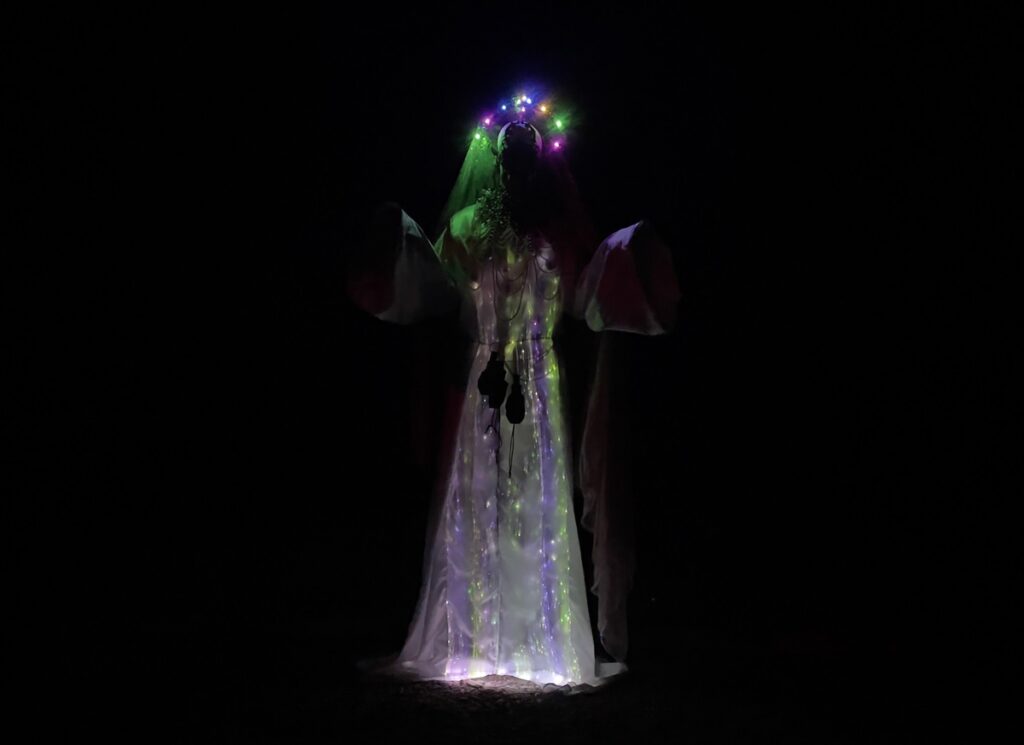
Yet it needs to be pointed out that as profoundly human the relationship between Farren and Trinity seems to be, it’s not fully human. Trinity is an immortal who’s drawn us all to this very remote castle because it’s where the veil between our realms is at its thinnest. Her journey back is coming at the hands of a powerful, omniscient being—the Archivist, wearing an impressively otherworldly costume and embodied assuredly by Minard—who speaks to us kindly and knowingly about our lives. And perhaps most important, the entire experience is staged within one of the most remarkable environments I’ve ever visited.
It’s hard to overstate how much Valediction both benefits from and feels perfectly suited for the location in which it’s staged. Hard Luck Castle is a round, brick, multi-level structure that’s fully off the grid. It can’t help but feel otherworldly and Valediction’s excellent addition of surreal lighting and sound effects only enhance these natural qualities. The castle’s decorative features feel mystical in a way that aligns with the mythology the show embraces and the spaces within the castle lend themselves to at times powerfully dramatic effect, especially during the show’s penultimate act, which takes place up a spiral staircase and within the castle’s observatory. There, surrounded a full 360 degrees by observation windows and by dozens of flickering candles, we engage in a discussion on all the things that may have been as both actors and audience are enveloped by what feels like stars situated both above and below. It’s an otherworldly setting for a magical scene that would be the show’s standout were it not for the final sequence that follows, and which is set outside the castle.
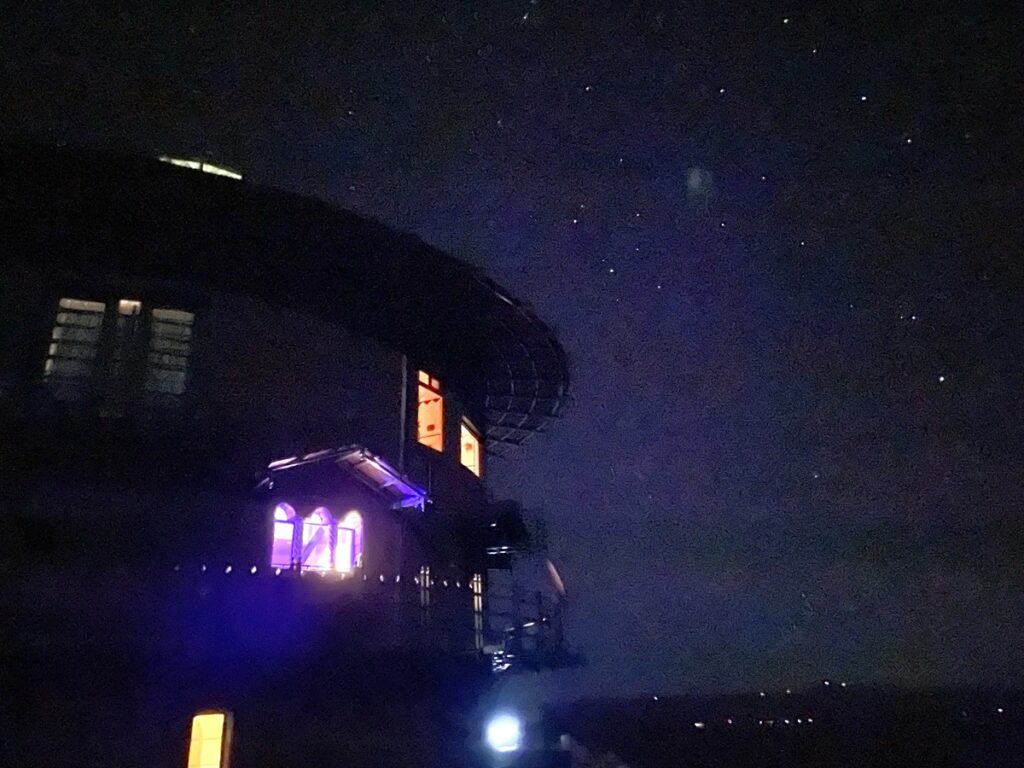
Hundreds of miles away from any cities, hours after sunset, the stars you can see above as Farren says goodbye to Trinity are breathtaking and truly make you feel like a small part of something bigger that perhaps we don’t yet fully understand. Learning to say goodbye is necessary, and one thing Valediction reminds us is how fundamentally human that is, but it also seems to suggest that maybe, just maybe, there’s a chance our lives and souls might intersect again in some way. After all, if there is an edge of all that is knowable, that would suggest that there’s something that exists beyond.
Valediction is a staggeringly bold swing by a still relatively new voice in immersive theater. I can’t imagine the complexity involved in staging a show that’s so remote—not the least of which is enticing people to make the considerable drive out there. Yet there’s something about being so removed from life to make you appreciate it all that much more. We get a real sense of how precious and beautiful it is in all of its complexities—even when they’re painful and difficult. While Valediction gives its audiences much to consider about saying farewell, ironically, I came away unsure that “the art of saying goodbye” is actually a thing. It’s a captivating subtitle, and one can certainly learn to be more thoughtful about letting go of their loved ones, but I don’t know that there’s an actual art to it. But Valediction shows that there’s absolutely an art to producing shows about saying goodbye, and Firefly Tapestry Storytelling seems to understand it beautifully.
Valediction: The Art of Saying Goodbye by Firefly Tapestry Storytelling ran January 12-14, 2024 at the Hard Luck Castle in Goldfield, NV.

